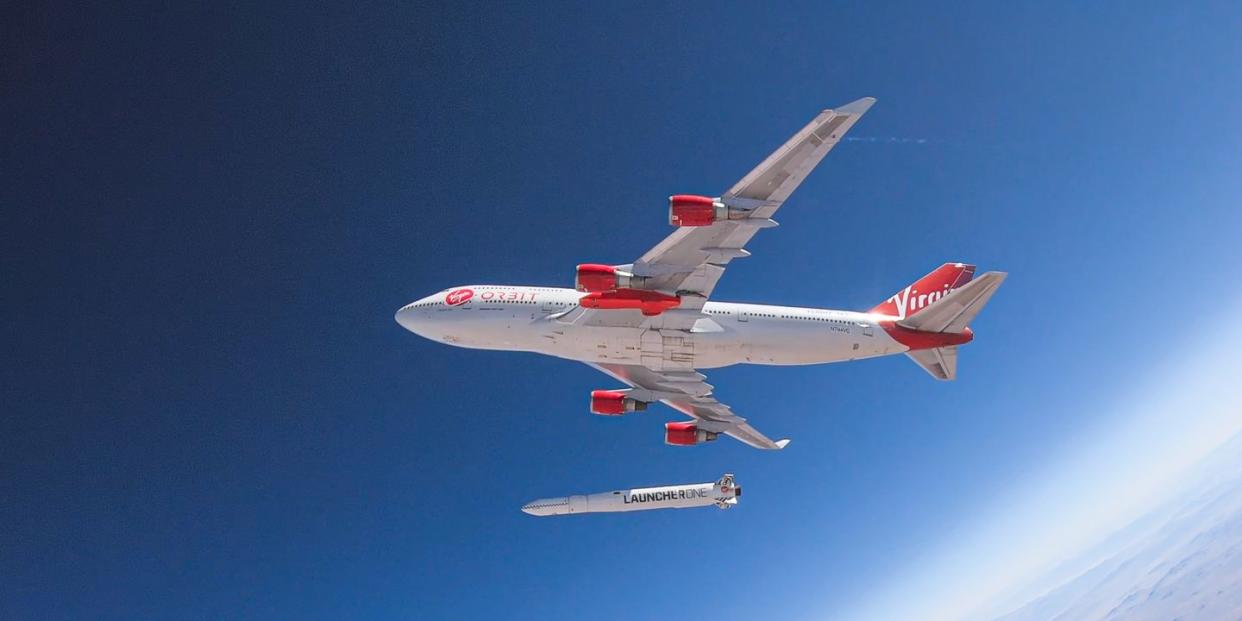Virgin Orbit's LauncherOne Rocket Fails Minutes After Test Launch

Sir Richard Branson's company Virgin Orbit conducted a critical flight test of its LauncherOne system this weekend.
Shortly before 4 p.m. EDT on Monday, May 25, the company tweeted that the mission terminated shortly after Cosmic Girl released the LauncherOne rocket.
A successful launch would have been a boon to Virgin Orbit, which has been developing its air-launch system for the past five years.
Update: Shortly before 4 p.m. EDT, Virgin Orbit's Cosmic Girl aircraft released the LauncherOne rocket. But minutes into flight, the rocket failed, according to a company tweet. Fortunately, Cosmic Girl's crew—a chief test pilot, co-pilot and two launch engineers—are safe.
We've confirmed a clean release from the aircraft. However, the mission terminated shortly into the flight. Cosmic Girl and our flight crew are safe and returning to base.
— Virgin Orbit (@Virgin_Orbit) May 25, 2020
Update: After postponing yesterday's launch, Virgin Orbit tweeted that it will conduct the first flight test of its LauncherOne system during a four-hour window starting at 1 p.m. EDT today.
Our team has worked diligently to resolve the sensor issue and recycle the system. We’re now back in the countdown, and are currently targeting another launch attempt tomorrow, with our window again open from 10 AM to 2 PM Pacific (17:00 – 21:00 UTC). pic.twitter.com/2cifLLKgfK
— Virgin Orbit (@Virgin_Orbit) May 25, 2020
Update: Virgin Orbit tweeted early Sunday morning that they would be postponing today's launch due to a faulty sensor. We will update this post with additional information.
This means we are scrubbed for today. Currently, it appears we’ve got a straightforward path to address this minor sensor issue and recycle quickly. The crew are already hard at work putting that plan into action. We’ll provide an update on the new launch target later today.
— Virgin Orbit (@Virgin_Orbit) May 24, 2020
Original article below:
This weekend, Virgin Orbit, an offshoot of Sir Richard Branson's aerospace company Virgin Galactic, is planning to conduct a key test of its LauncherOne system.
The company said they will be monitoring a four-hour launch window starting at 1 p.m. EDT on Sunday, May 24, and Monday, May 25. The retrofitted 747 will depart from California's Mojave Air and Space Port and release the 70-foot-long LauncherOne rocket over the Pacific Ocean.
Virgin Orbit conducted a series of 'wet dress rehearsals,' where its retrofitted 747 aircraft, called Cosmic Girl, flew around with the fully fueled rocket in tow. In July, the company conducted a critical drop test, during which Cosmic Girl released a rocket from its clutches.
You can follow Virgin Orbit on Twitter for updates about this weekend's launch.
Dude, where's my rocket? pic.twitter.com/KGoc4DNQRt
— Virgin Orbit (@Virgin_Orbit) July 10, 2019
Cosmic Girl will sail up to about 35,000 feet, where it will release the multi-stage rocket from its pylon. At that point, the rocket—which is powered by the NewtonThree engine and can carry payloads of up to about 1,100 pounds—will fire up and head into orbit. The custom airplane and mobile launchpad is helmed by a pilot, co-pilot, and three flight engineers.
"Should we defy the historical odds and become one of those exceedingly rare teams to complete a mission on first attempt, we will deploy a test payload into an orbit, take our data, and then quickly de-orbit so as not to clutter the heavens," the company said in a statement. If LauncherOne makes it to an altitude of 50 miles above Earth's surface, it will break previous air launch records.
This test has been a long time coming for the company, which began developing the LauncherOne system for the past five years. Once testing is completed, Virgin Orbit plans to build up to 24 rockets each year in an effort to compete with other cubesat-launching companies like Rocket Lab. Cosmic Girl can take off from a wide range of airports around the world and, eventually, CEO Dan Hart said they'll be able to launch a rocket with as little as four hours notice.

The company announced on April 10 that the U.S. Space Force had contracted Virgin Orbit and VOX Space to launch a series of three small cube sat missions with the LauncherOne system. A number of other clients in the private and public sector have signed on including NASA, the Pentagon's Defense Innovation Unit and a number of private companies, CNBC reports.
In October, the Verge reported that Virgin Orbit planned to partner with Polish satellite company SatRevolution to send a suite of CubeSats to Mars. These missions, which are scheduled to take place after 2022, would be the first commercial missions to the Red Planet.
Launching a rocket from an airplane isn't a new idea. In 1990, Northrop Grumman subsidiary Orbital ATK launched the Pegasus rocket from its Stargazer aircraft a total of 44 times between 1990 and 2016.
The late Microsoft cofounder Paul Allen's Stratolaunch Systems has also used this launch method to send a series of rockets into orbit. Their vehicle, Stratolaunch, has a massive 385-foot wingspan—the largest in the world.
And at around $12 million per flight, Virgin Orbit's 747-based launches are incredibly cost effective compared to previous air-launch methods. (A Pegasus mission, for example, costs around $40 million.)
Branson's aerospace company Virgin Galactic plans to send tourists on a 10-minute-long journey into orbit using this method, too. This weekend's test will be a critical step in helping the Virgin Brand soar to new heights within the air launch arena.
You Might Also Like


